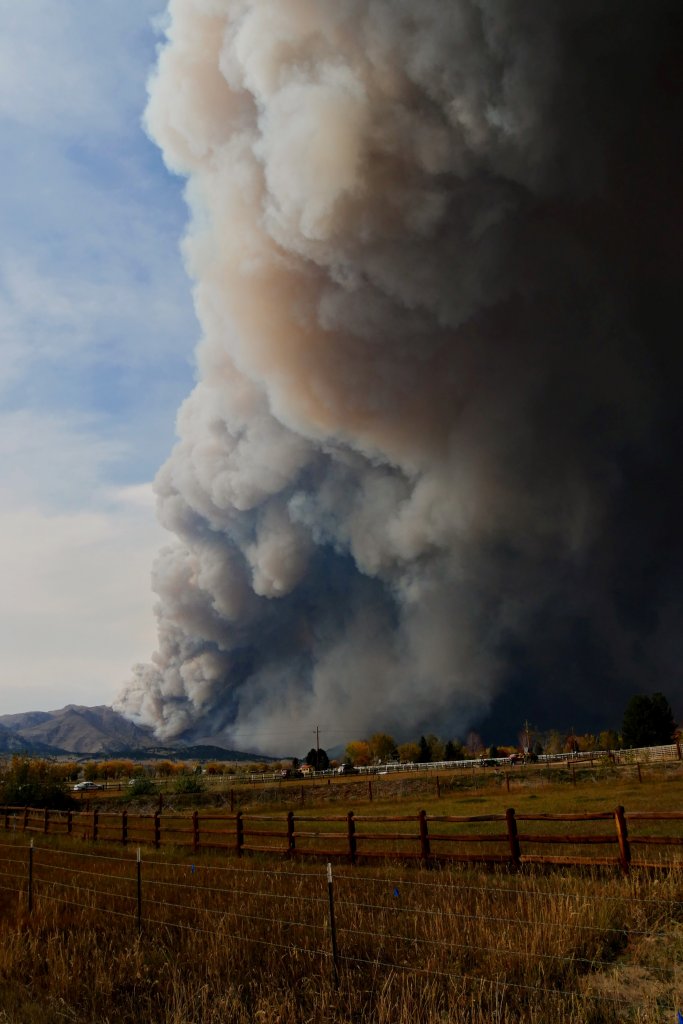A wildlfire is burning rapidly toward your home in the Idaho mountains.
Suddenly, you’ve been told that you must leave your home and evacuate now!
Maybe you have time to ready family and property, or maybe not.
What to do? Our advice is to leave. Sixty percent of lives lost to wildland fire occur because people chose to “wait and see.”

Better yet, if you have a home in the wildland-urban interface – the rural spaces where towns/cities blend into rangelands and forests – be aware that these areas can be prone to wildfires. Make advance preparations so you’re ready to evacuate if that horrible moment comes and you must leave quickly.
Ready your Family
Gather everyone and let them know you are getting ready to evacuate.
- Dress for safety. Put on socks, closed-toed leather shoes or boots, long pants, and a long-sleeved shirt. Leather gloves, a bandanna, and a hat can also be handy.
- Ready your vehicles. Park vehicles facing the direction of escape. LEAVE KEYS in IGNITION.
- Ready your animals. Put pets in carriers (in a safe, accessible place), ready to load into your vehicle. Load horses or other livestock into trailers and hitch the trailers to vehicles.
- Put your emergency kit and valuables in vehicles.
- Contact the neighbors. Check with neighbors to see if they need assistance. Offer to share transportation. Notify others when you leave and where you plan to go.
If it’s Safe/If There’s Still Time
If all vehicles are packed and everyone is ready to go, you may still have time to do a few things to protect your home.
- Ready your house. Close all windows and doors. Place removable covers on attic and basements vents. Remove flammable window treatments. Close metal window blinds. Turn on all outside lights to help firefighters find your house.
- Prepare emergency water supplies. Place generators near pumps to provide backup power for your well. Connect hoses and place them where they can be easily found. Ensure that enclosed water tanks are marked and easily accessible.
- Clear outdoor living spaces. Move flammable items to enclosed storage areas and/or cover them securely.
- Store recreational vehicles. Move recreational vehicles away from structures and/or into enclosed storage areas or cover them securely.
- Wet it down. Strategically place sprinklers to wet structures and surroundings and turn them on.
- Break up contiguous fuels. Open gates to prevent flames from spreading from a fence to a structure.
Red-Cross Recommended Emergency Supply Kit
- 3-day supply of water (1 gallon per person/day is recommended) and food
- 1st Aid kit and sanitation supplies
- Flashlight, battery powered radio, and extra batteries
- An extra set of car keys, cash, credit cards
- Extra eyeglasses, contact lenses, contact solution, prescriptions and medications
- Important family documents and contact numbers, including insurance documents
- Map marked with evacuation routes
- Easily carried valuables and irreplaceable items
- Personal electronic devices and chargers
If there is time, a member of your local fire service, law enforcement, or emergency responder agency may stop by to alert residents. In some areas, homeowners receive automated telephone notification and/or texts on their cell phone.
In Idaho, county sheriffs are responsible for ordering evacuations.
Media outlets are another good source of information. Check radio stations, the Emergency Broadcast System and local government websites for updates.
Thanks and Good luck!
- Ivy Dickinson, Executive Director, Idaho Firewise
- Photo courtesy Unsplash

